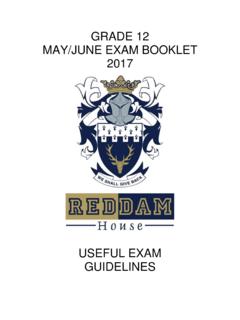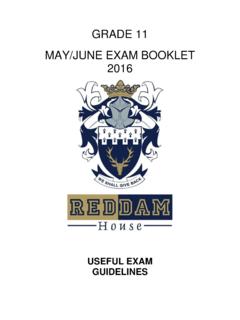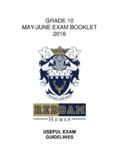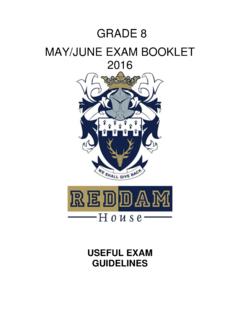Transcription of GRADE 10 - Reddam House
1 GRADE 10. NOVEMBER 2014. EXAM. GUIDELINES. GRADE 10 Exam Timetable NOVEMBER 2014. DATE SUBJECT TIME. 5 Nov (Wed) History 9:00 12:00. 6 Nov Maths Core P1 9:00 11:00. (Thur) Maths Lit P1 9:00 10:30. 7 Nov (Fri) Business Studies 9:00 11:00. 8 Nov Economics 9:00 11:30. (Sat) Visual Art 9:00 11:00. 10 Nov (Mon) Physical Science 9:00 11:00. 11 Nov (Tues) Afrikaans P1 9:00 11:30. 12 Nov (Wed) Life Science 9:00 11:00. CAT Prac 9:00 12:00. 13 Nov IT Theory 9:00 11:00. (Thur) French/Dance Studies 9:00 11:00. 14 Nov (Fri) English P1 9:00 12:00. 15 Nov (Sat) Dramatic Arts 9:00 11:00. 17 Nov (Mon) Geography 9:00 11:00. 18 Nov (Tues) Afrikaans P2 9:00 10:00. 19 Nov (Wed) Design 9:00 11:00. 20 Nov (Thur) Accounting 9:00 11:30. 21 Nov (Fri) English P2 9:00 11:00. 22 Nov (Sat) AP Maths 9:00 11:00. 24 Nov Maths Core P1 9:00 11:00. (Mon) Maths Lit P1 9:00 10:30. 25 Nov (Tues) CAT Theory 9:00 11:30. 26 Nov (Wed) Music 9:00 11:00. STUDY TIPS. BEFORE THE EXAM DAY. Do not miss ANY days of school.
2 If you are unwell, come to school to write your test and then go home. Then you will be able to see how well you know your work and teachers can help you, before the exams, in areas where you are not sure. Make sure that you have all the notes given in class and that all your assignments are completed. Class work is always added to the exam mark to make your term mark and it is usually worth as much, if not more, than the exam mark. At High School you only need to come to school to write the exam. You must make sure that you use your time at home well: study at set times of the day- ask people to test you, make notes, summarise, practice labelling diagrams and maps be active in your learning - don't just read over your work eat healthy snacks. exercise every day. go to bed at a sensible time ON THE EXAM DAY. You need to arrive for exams at 7h45 latest. You will normally be asked to enter the Main Hall at 8h00. Examiners have to hand out up to 300 papers and this takes time.
3 There is also 10 minutes of reading time before the exam begins. If you are not being collected immediately after the exam, then study in the library. For security reasons you are not allowed to walk to the shops. Bring a book to read. Exams involve a lot of waiting around. Dress in FULL school uniform. Bring all the required stationery and a spare pen. CHECK if you need calculators or glue etc Wear a watch you are NOT allowed to have a cell phone on your desk to check the time. DURING THE EXAM. Use the 10 mins reading time at the start to read through all the test questions. Draw a marking margin on the right hand side of your page. Be sure to follow the instructions given for each question. Note how many marks a question is worth so that you know what depth of answer (how many points) to give. Number your questions EXACTLY as they are numbered on the exam paper. Do NOT use Tippex Simply cross out neatly and rewrite. Don't sit gloomily on one question which you can't do - leave a space and move on come back to it at the end.
4 REMEMBER If you have time, review and check ALL your answers. Approx 1 mk = 1 min Subject Music Practical Date Monday 20th October Tuesday 28th October 2014. Length of exam hour Marks 100. Check individual time slots Requirements Scales/Technical Work 3 Pieces Sight Reading Subject German Date Thursday 30th October Length of paper 2 hours Time 14:30 16:30. Marks Please ask the German teacher for information Subject History Date Monday 5th November Length of paper 3 hours Time 9:00-12:00. Marks 150. Content to be learnt for the exam FRENCH REVOLUTION. NAPOLEON. RUSSIA: REVOLUTION, LENIN, IMPLEMENTATION OF COMMUNISM. Types of questions SECTION A: 50 MARKS. Discursive essay SECTION B: 50 MARKS. Multiple source-based questions SECTION C: 30 MARKS. Source-based essay SECTION D : 20 MARKS. Single source textual analysis Tips for students in preparation for the exam Remember that you are preparing for a skills and content - based assessment. Revise (learn thoroughly) all the concepts, contexts, and content in your class notes, typed notes and resource books.
5 Revise the material from a chronological and thematic perspective. Pay close attention to skill applications which include: knowledge, comprehension. analysis, synthesis, evaluation, argument, interpretation Do not leave out any sections. Learn all content thoroughly in order that you may attempt comparative studies. Revise the skill requirements for the development of discursive and source . based essays. Pay attention to the rubrics used for the assessment of the different types of essays. Work through activities in the handouts and the resource books. Focus on preparing an exam strategy, especially with reference to time management. In the exam, pay close attention to the focus question as this gives you your direction when engaging with the sources. Ensure that you are always working with the appropriate resources. Pay close attention to the demands of the questions as well as the mark allocation for each question. Subject Maths Paper 1. Date Thursday 6th November Length of paper 2 hours Time 9:00 - Marks Approx 135.
6 Content to be learnt for the exam and marks are approximate: Algebra, Equations and Inequalities: ( 40 marks ) GRADE 9 Rev Algebra, fractions, products, FOIL, Factorising ( common factor, common bracket, DOTS, difference of 2. squares, sum & difference of two cubes, trinomials, switch-rounds, grouping, exponential common factor Equations ( 15 marks )exponential, literal, with fractions, quadratic, simultaneous, word sums, inequalities, notations interval and set-builder Exponents: laws, negative exponents, rational exponents, simplifying exponential expressions by factorizing, exponential equations. Functions and Graphs: ( 40 marks ) all graphs drawing and find their equations, domain, restricted domain, range, function notation, average gradient, increasing & decreasing, vertical shifts, assymtotes, axes of symmetry, turning points Number Patterns and sequences: ( 15 marks ) finding the nth term of linear & quadratic number patterns. Finance and Growth: ( 10 marks )Simple and Compound interest, inflation, hire purchase, growth, time-lines, exchange rates, population growth.)
7 Probability: ( 15 marks ) Tree-diagrams ( with & without replacement ), Venn diagrams ( or / and ) complementary events, mutually exclusive/ non-mutually exclusive, intersection and union. Types of questions Like the questions in your text-books, worksheets, tests and old exam papers. Knowing basic skills and definitions ( about 40% of the paper). Routine calculations ( about 20 to 30% of the paper). Complex calculations ( about 20% of the paper). Problem solving ( 10 to 20 % of the paper). Tips for learners in preparation for the exam PRACTISE, PRACTISE, PRACTISE with a PEN in your hand. You must study your notes in the booklets you have been given on each section You cannot rely on having understood the work during the year. There is too much new work you have studied. You MUST do a few examples of each type of question . either from the booklet, or from old tests, or from past papers. You must mark the questions you try it is no good doing them if you get them all wrong all your work and tests should have the correct answers on if you marked efficiently in class.
8 DO NOT LEAVE YOUR STUDYING UNTIL THE NIGHT BEFORE!!!!!! There is too much to do. GOOD LUCK. If you work hard, you will reap the rewards Learning area Mathematical Literacy Paper 1. Date Thursday 6th November 2014. Length of paper 1 hour Time 9:00-10:30. Marks 120. Content to be learnt for the exam 1) Numbers formats and conversions, expressed in words. Positive and negative numbers Percentages Ratios, Rate & Proportion Conversions between units 2) Patterns, relationships 3) Tables, equations and graphs 4) Financial documents 5) Tariff systems 6) Income and expenditure 7) Interest 8) Banking 9) Taxation 10) Conversions, Length and distance, Mass, Capacity, Temperature 11) Perimeter, Area and Volume 12) Time 13) Scale, Plans, Models, Packing arrangements 14) Data Handling: Frequency tables, Bar graphs, Line graphs, histograms, pie charts, mean, median, mode and range. 15) Probability: Expressions of likelihood, two events and tree diagrams. Types of questions Paper 1 covers all LO's up to Thinking Level 3.
9 (see below). Thinking Level 1 Knowing Thinking Level 2 Applying routine procedures in familiar contexts Thinking Level 3 Applying multi-step procedures in a variety of contexts Thinking Level 4 Reasoning and reflecting Learning Outcomes LO1 Number and operations in context LO2 Patterns and relationships (graphs). LO3 Shape and space and measurement LO4 Data handling Tips for learners in preparation for the exam PRACTISE, PRACTISE, PRACTISE. You must study your notes. You cannot rely on having understood the work during the year. There is too much new work you have studied. You MUST do a few examples of each type of question . either from the booklet, or from old tests, or from past papers. You must mark the questions you try it is no good doing them if you get them all wrong all your work and tests should have the correct answers on if you marked efficiently in class. Subject Business Studies Date Friday, 7th November 2014. Length of paper 2 hours Time 09:00 11:00.
10 Marks 180. Content to be learnt for the exam Insurance (chapter 1). Ethics (chapter 2). Environments (chapter 5). Forms of ownership (chapter 6). Entrepreneurship (chapter 7). Business functions (chapter 8 and 8B ). Types of questions Section A multiple choice, matching columns, True and False 50 marks Section B Short questions 150 marks Tips for learners in preparation for the exam Students need to watch their time during the exam Exam case study is on the Service industry. Important students relate examples to the industry. Subject Economics Date Saturday, 8th November 2014. Length of paper 2 hours Time 9:00 11:30. Marks 250. Content to be learnt for the exam The following chapters will be covered in the exam Macro economics Circular flow model Business cycles Economic structure of South Africa Factors of production Three economic systems and delivering of socio-economic services Micro economics Demand and supply Utility theory Production cost theory Production possibility curve Price elasticity of demand and supply Indifference curve Budget line Economics pursuits Economic growth and development in South Africa Economic and social performance indicators and their uses.





